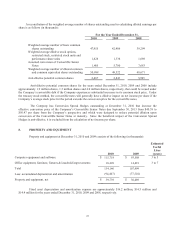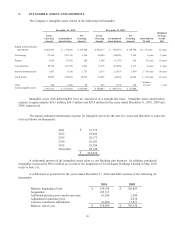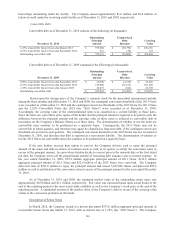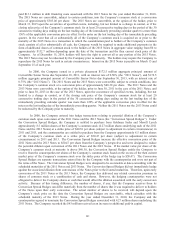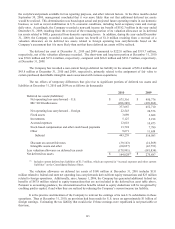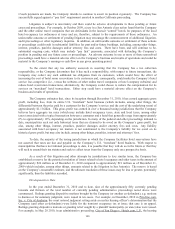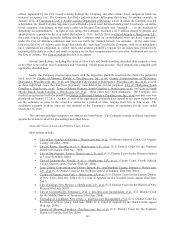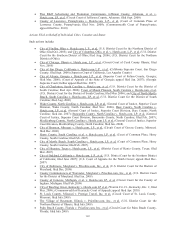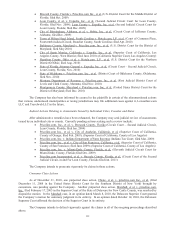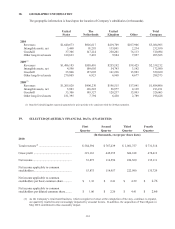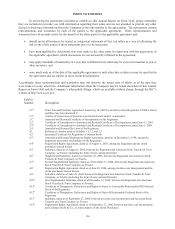Priceline 2010 Annual Report Download - page 180
Download and view the complete annual report
Please find page 180 of the 2010 Priceline annual report below. You can navigate through the pages in the report by either clicking on the pages listed below, or by using the keyword search tool below to find specific information within the annual report.
106
At December 31, 2010, the Company has approximately $442.3 million of state net operating loss
carryforwards that expire mainly between 2020 and 2021, $82.1 million of foreign net operating loss carryforwards,
of which $5.7 million expire between 2028 and 2030, and $3.9 million of foreign capital allowance carryforwards
that do not expire. At December 31, 2010, the Company also had approximately $1.3 million of U.S. research credit
carryforwards that expire from December 31, 2019 to December 31, 2020 and are also subject to annual limitation.
Effective January 1, 2010, the Netherlands modified its corporate income tax law related to income
generated from qualifying “innovative” activities (“Innovation Box Tax”). Earnings that qualify for the Innovation
Box Tax will effectively be taxed at the rate of 5% rather than the Dutch statutory rate of 25.5% (25% as of 2011).
Booking.com obtained a ruling from the Dutch tax authorities in February 2011 confirming that a portion of its
earnings (“qualifying earnings”) is eligible for Innovation Box Tax treatment. The ruling from the Dutch tax
authorities is valid from January 1, 2010 through December 31, 2013 (the “Initial Period”). In this ruling, the Dutch
tax authorities require that the Innovation Box Tax benefit be phased in over a multi-year period. The Innovation
Box Tax did not have a material impact on the Company’s 2010 results. The amount of qualifying earnings
expressed as a percentage of the total pretax earnings in the Netherlands will vary depending upon the level of total
pretax earnings that is achieved in any given year.
In order to be eligible for Innovation Box Tax treatment, Booking.com must, among other things, apply for
and obtain a research and development (“R&D”) certificate from a Dutch governmental agency every six months
confirming that the activities that Booking.com intends to be engaged in over the subsequent six month period are
“innovative.” Should Booking.com fail to secure such a certificate in any such period – for example, because the
governmental agency does not view Booking.com’s new or anticipated activities as “innovative” -- or should this
agency determine that the activities contemplated to be performed in a prior year were not performed as
contemplated or did not comply with the agency’s requirements, Booking.com may lose its certificate and, as a
result, the Innovation Box Tax benefit mau be reduced or eliminated.
After the Initial Period, Booking.com intends to reapply for continued Innovation Box Tax treatment for
future periods. There can be no assurance that Booking.com’s application will be accepted, or that the amount of
qualifying earnings or applicable tax rates will not be reduced at that time. In addition, there can be no assurance
that the tax law will not change in 2011 and/or future years resulting in a reduction or elimination of the tax benefit.
The Company also received approval from U.K. tax authorities as to the deductibility of certain
intercompany interest expense resulting in a cumulative benefit to income tax expense of approximately $3.0 million
that was recorded in the fourth quarter of 2010.
The effective income tax rate of the Company is different from the amount computed using the expected
U.S. statutory federal rate of 35% as a result of the following items (in thousands):
2010
2009
2008
Income tax expense at federal statutory rate $ 261,199 $ 154,806 $ 96,637
Adjustment due to:
State taxes 6,762 5,226 3,690
Foreign rate differential (58,927) (31,892) (18,947)
Other 9,038 7,964 6,954
Increase (decrease) in valuation allowance 69 (183,272) 1,837
Income tax expense (benefit) $ 218,141 $ (47,168) $ 90,171
The Company accounts for uncertain tax positions based on a two step approach of recognition and
measurement. The first step involves assessing whether the tax position is more likely than not to be sustained upon
examination based upon its technical merits. The second step involves measurement of the amount to recognize.
Tax positions that meet the more likely than not threshold are measured at the largest amount of tax benefit that is
greater than 50% likely of being realized upon ultimate finalization with the taxing authority.



